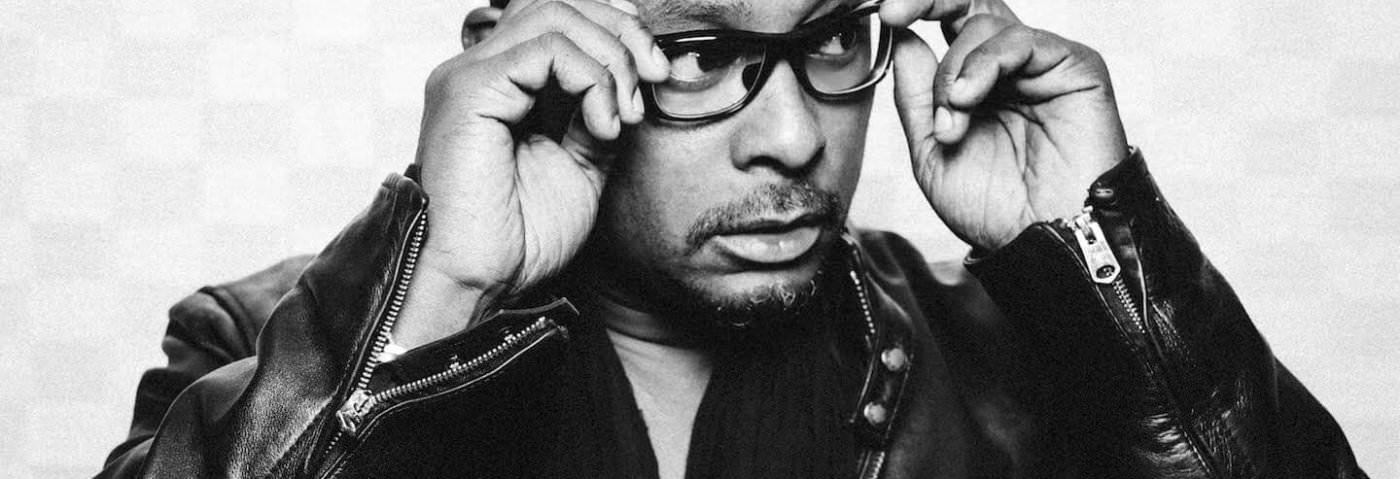Transmat boss and techno statesman Derrick May opens up to Kristan Caryl.
Derrick May is a famously warm and forthcoming character. He’s the techno spokesman who won’t shy away like some of his peers. Talking to him feels like talking to a friend. He laughs, asks his own questions and will affectionately call you a “motherfucker.” When he confirms he is not currently making music, though, his tone deepens and softens. He seems to speak more intimately and closely into the phone.
“I’m not at the moment feeling inspired. It’s not the music or the music industry. The real enemy became time, time is a motherfucker. If you let it go it can truly cause you problems. We see ourselves in the mirror as the same people we were 20 years ago but we are never the same people. You are an illusion to yourself. When I decide to make music, I don’t want to make music of a young, angry, passionate Derrick May that I don’t even know any more. He was a hero of mine. Wow. If I could meet the Derrick May I was, now, and even stand in the same room as him for five minutes, I’d be enamoured. He was a brave, fearless kid who didn’t care about anything or anybody.”

“I have a family, bills and responsibility, people depending on me in my record label. You have status. You gain and receive and become fearful of losing. It’s a fact of life. I don’t care who you are. I don’t care if you’re Andy Warhol or Salvador Dali. You fight for your thing but then there is a reality to success: you can’t go back. Once you give up your talent, you no longer own it. They use that information then judge you for it for the rest of your life. I’m trying my best not to live the legacy of one song or one era. I’m constantly trying to work with different things and develop new inspirations.”
One way he is doing that is by taking time to himself in his “beautiful” new home in the woods around Detroit. It has a meandering crazy-paving footpath surrounded by shrubbery that leads up to the front door, then towering green trees all around the boundary. Being at his “safe haven” gives him peace and a chance to think about things in the simplest way.” Here he is away from people who “want things“ and are “constantly patronising you” and people who “you cannot know are genuine.” Detroit artists are famously uninterested in having smoke blown up their ass.
I'm trying my best not to live the legacy of one song or one era.
Derrick sighs deeply. “I can’t imagine not living and dreaming and not trying to take a step forward even if you know there is darkness in front of you. I’m still not afraid to take a step and go ahead and give it a try.”
When he first takes our call, 56-year-old May is navigating a roundabout. “Staying in Detroit is a sacrifice and a gamble,” he says on the after school pick up with his daughter. He then explains that humble UK export ‘the roundabout’ is something people in Michigan can’t get their heads around. “It is a cultural phenomenon for people outside the UK. It’s incredible that you can have the driver’s etiquette required to make them work.”
Of course, it is not the trials and tribulations of the roundabout – developed by the British in the 1960s, and first introduced to the States in the 1990s – that makes life in Detroit hard. It is the lasting devastation caused by the demise of the motor industry. “Jobs slowly left the city and eventually it trickled down and affected everyone, leaving entire neighbourhoods abandoned. People couldn’t afford to stay here and live, they couldn’t afford their homes, so literally they left in the middle of the night.”
Derrick himself grew up in affable neighbourhoods and went to the best schools in the city. He did leave for a while to spend time in Australia, Switzerland, Italy and Amsterdam. “But I always come back home. There’s nothing like coming home and being part of something, man.”That something, of course, is music. It always was. Back in the early eighties when he, Juan Atkins and Kevin Saunderson were becoming the famous Belleville Three, Derrick was “young, angry with a 28″ waist and on a mission to save the world from bad music.”
And he did, for a time, thanks to formative techno tracks like “Nude Photo” and then “Strings of Life.” “Strings” was actually made first, but because Derrick didn’t think people would get it, he held onto it until 18 months after the release of “Nude Photo.”
“I hated Detroit back then,” he says with passion. “I hated the mentality, I thought people were stupid, dumb, slow, behind, not on the ball. And maybe they were, maybe I was smarter, or maybe I was just not paying attention or talking to the right people, but I do know I wouldn’t be the person I am today if it wasn’t for people from Detroit, in particular, who took me by the hand and showed me how to do this, how to live and survive. For all the things I thought were stupid and ridiculous, they turned out to benefit me extremely.”

Nowadays the city is different, a little safer, and there is a frisson of excitement as creative industries return with businesses starting to flourish downtown. Quicken Loans founder Dan Gilbert and Mayor Mike Duggan would like you to believe that is because of their investment in the city. But Derrick is level headed on the matter. “They don’t own the city as much as they have sold it,” he says, making reference to the new, young, predominantly white businesses that have popped up.
“Detroit has always been owned by two or three kingpin corporate heads,” he says. “Before the current kingpin Dan Gilbert, it was Ford, before that it was merchants from all over the world, and in between all that it was organised crime syndicates.” He then admits that, “yes, there is a bubble now downtown in a small two or three square mile area, but it’s nothing that really impacts the locals in Detroit at all.”
Though he was perfectly happy living abroad, May says home will always be home. “I feel a close connection to what is left of the artistic community. A lot of people have left for good reason, for safety, education for their kids, but the city is safer than it was, and there is a ton of enthusiasm. Not everyone is able to benefit from that enthusiasm, but that alone is enough to make you believe in something.”
His own role now is something of a mentor to young artists who he works with on his Transmat label (in the past he has done similar things with the likes of Stacey Pullen and Carl Craig – the latter even lived with him during their early years). As is often the way, the releases this year came in a flourish of three in close succession, then things go quiet. It’s the very antithesis of the factory floor, convey belt method that many labels, and most famously Motown, have followed in order to stay relevant.
“It comes from looking for the perfect beat,” says Derrick as he arrives back at his house. “But I rarely ever find it.” For May to release music, relationships with artists are important. This year, Scan 7, Drummer B and Mbulelo put out richly detailed and soulful techno. He doesn’t accept everything off the bat but instead asks producers “over and over again” to work on something, to develop their sound. He believes it is important to communicate back and forth and have as much involvement as possible without discouraging them and taking from their own style.
With a hint of sombreness, he admits “I can’t say that I can help people like I used to. My word and encouragement doesn’t give a kid the opportunity they deserve anymore.” He is referring to how the industry has changed, but rather than go off on an old man rant, he stops himself. “Let’s not be too negative. Let’s try to find some middle ground, there has to be some hope in this for the young kids coming through.“
He continues. “I’m really looking for exactly the right thing so that the legacy of the label can continue and these artists can really establish themselves. When I come across the right people, it takes months to develop what I consider a great package that can stand the test of time.”
Let’s not be too negative. Let’s try to find some middle ground, there has to be some hope in this for the young kids coming through.
Of course, the “Strings of Life” tune he wrote using a snippet of a song Michael James was working on for a ballad project has more than stood the time. In fact, it has been a towering, arguably overbearing presence for May ever since.
“Making those tracks was a blessing,” he says. “There was no pressure after they took off because we were too busy. Too busy making music, doing it, we were in the zone so we didn’t realise there was this thing happening around us until we went to England.” That was in late 1987 and led to licensing deals with journalist Neil Rushton which resulted in the fabled and genre-defining compilation Techno! The New Dance Sound Of Detroit on Virgin Records. After that came huge exposure for Detroit producers in the UK, and that continues to this day.
He might not have felt it at the time, but it seems the pressure has grown so great over the years that he has barely released any music since. Instead, he continues to play select DJ shows around the world, even though he says they take “a tremendous amount of energy.” He has also recently lead the City of London Sinfonia orchestra in interpretations of his pioneering works of electronic music, conducted by Dzijan Emin, and continues to enjoy A&Ring for Transmat.
“I don’t just go out. When I go out, I am an assassin,” he says, at which point he explains he has some “father-daughter business to attend to” and will call back later. He never does. Maybe a roundabout is to blame.
Transmat’s latest releases from Scan 7, John Hester and Biz are out now. For more information, visit their home online at www.transmatrecords.com.
You might be interested in…
Derrick May recently contributed the foreword to “DJ Faces” – a 200 page photo journal chronicling “A Journey Through House Music”.
This mammoth project is the brainchild of Jos Kottmann a fashion photographer and dance music aficionado based in Rotterdam. Jos spent twelve years (about one-third of his life) capturing over 100 photographs of some of the most seminal DJs in dance music. He even took time off his honeymoon to shoot Roy Davis Jr. in London. In that regard, his wonderful debut book “DJ Faces” owes as much to his patient and understanding wife as it does his persistence and passion for dance music.
For a 10% introductory discount use code DJFACES at checkout. For more information visit here or click on the image below.

